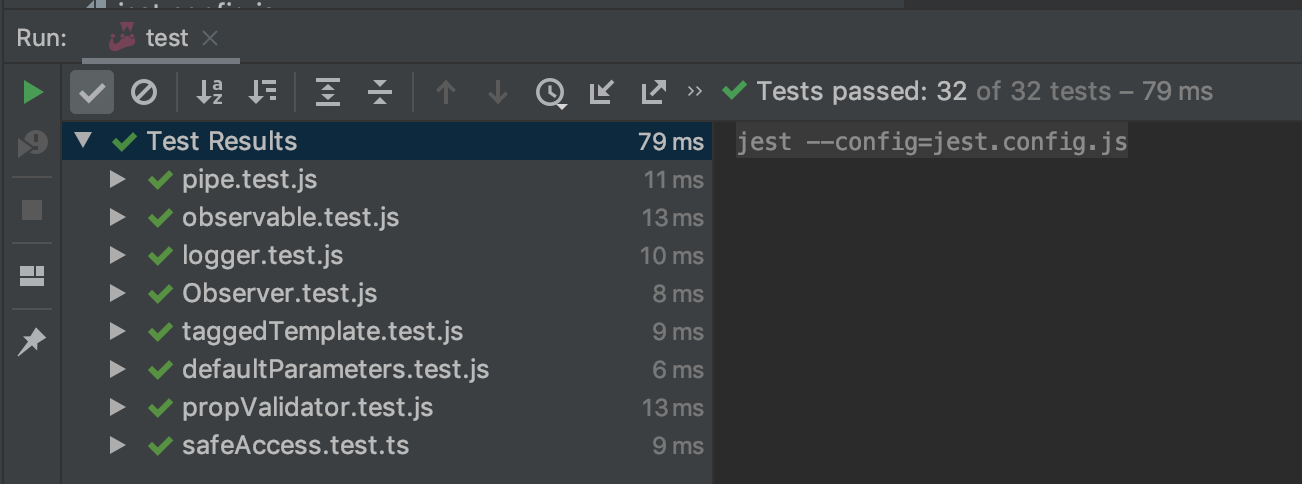In this tutorial we will see how to migrate a codebase from JavaScript to TypeScriptOpen in a new tab. We will migrate the code of my talk Advanced JavaScript Pattern (oh the irony, right?). Here you have the repositoryOpen in a new tab. You can also watch my talk here in SpanishOpen in a new tab. Let's start!
#Configuration
First of all is to include a tsconfig.json file in the root of your project. This file we will set the options for TypeScript:
{ "compilerOptions": { "moduleResolution": "node", "outDir": "./dist", "allowJs": true, "target": "esnext" }, "include": ["./src/**/*"], "exclude": ["node_modules"] }
moduleResolution specifies how TypeScript is going to resolve the dependenciesOpen in a new tab.
outDir will be the directory in which the TypeScript code will be compiled to. This will be the code that we will deploy or execute.
The allowJs option allows us to do an incremental migration, which is great!
target allows us to set the JavaScript version in which we want to compile to. We could also even set it to version es3 making our code be executable in older browsers.
Lastly, with include, we define which routes TypeScript's compiler should be checking. By convention, we should have our code in the src directory.
#Installation
Now we install TypeScript as a dev-dependency: npm i typescript -DE. We add to the scripts of the package.json the script of compilation:
{ "scripts": { "compile": "tsc --pretty" } }
Because we don't have any .ts file that we can compile we'll see that the compilation is successful:

#Migration
Let's try change the extension from .js to .ts and compile again:

What?! It compiles correctly! Well yes, any JavaScript file is valid TypeScript code.
TypeScript by default infers anything that it doesn't understand as anyOpen in a new tab. any is not cool, not at all. With the option noImplicitAny set to true in our tsconfig.json we will get an error in places TypeScript infers something to any.
{ "compilerOptions": { "noImplicitAny": true } }
Now when we compile we'll start to see some errors. To fully get TypeScript's advantages like: safety, refactorings and improved DX we need to help it by stating the types we use, and that's what we are going to do:
export function multiply(a = 1, b = 1) { return a * b } export function priceAfterTaxes(price, tax = multiply(21, 0.01)) { return price + price * tax }
Will become:
export function multiply(a = 1, b = 1) { return a * b } export function priceAfterTaxes(price: number, tax = multiply(21, 0.01)) { return price + price * tax }
Here we see that TypeScript doesn't need us to specify that a or b in the function multiply are numbers given that it's smart enough to infer it. Moreover, if it receives two parameters that are numbers, and we multiply them, what would the return type be? Well, obviously number.
#Never
Let's check the propValidator file:
export function isRequired() { throw new TypeError('Argument is required') } export function capitalize(string = isRequired()) { return string.toUpperCase().slice(0, 1) + string.slice(1) }
It becomes:
export function isRequired(): never { throw new TypeError('Argument is required') } export function capitalize(string: string = isRequired()) { return string.toUpperCase().slice(0, 1) + string.slice(1) }
never is a very interesting type which specifies something that's never going to change. It's not very common to use it, but in this case this function never returns anything. Here we see that TypeScript adapts to the great flexibility that JavaScript offers. It's in very few cases where we can't model a JavaScript program in TypeScript and there is always the any escape hatch.
If you want, you can checkout the basic types in the official documentationOpen in a new tab
#Classes
With classes, we see certain advantages in respect to their counterparts in JavaScript:
export class Subject { constructor() { this.observers = [] this._counter = 0 } set counter(value) { // https://github.com/tc39/proposal-private-fields this._counter = value this.notifyObservers() } get counter() { return this._counter } incrementCounter() { this.counter++ this.notifyObservers() } addObserver(observer) { this.observers.push(observer) } notifyObservers() { this.observers.forEach(observer => observer.notify(this)) } }
In TypeScript is:
import { Observer } from './Observer' export class Subject { private _counter = 0 private readonly observers: Observer[] constructor() { this.observers = [] } set counter(value) { // https://github.com/tc39/proposal-private-fields this._counter = value this.notifyObservers() } get counter() { return this._counter } incrementCounter() { this.counter++ this.notifyObservers() } addObserver(observer: Observer) { this.observers.push(observer) } notifyObservers() { this.observers.forEach(observer => observer.notify(this)) } }
Here we don't need to use anymore the convention _ to specify that a property or method is private. With TypeScript, we have available to us privacyOpen in a new tab with the private keyword –we also have protected and public–. By default, if we don't specify anything, it's public.
We also don't need to declare the types and do the assignations in the constructor like we do in the Observer file:
export class Observer { constructor(subject) { this.subject = subject this.subject.addObserver(this) this.value = 0 } display() { return `Observer counter: ${this.value}` } notify(subject) { this.value = subject.counter } }
We can do as follows:
import { Subject } from './Subject' export class Observer { private value = 0 constructor(private readonly subject: Subject) { this.subject.addObserver(this) } display() { return `Observer counter: ${this.value}` } notify(subject: Subject) { this.value = subject.counter } }
Moreover, if in the constructor we specify private or public:
class Foo { foo: number constructor(foo: number) { this.foo = foo } }
It's the same as this:
class Foo { constructor(public foo: number) {} }
#Generics
Let's see a more complex example:
// Well later see how we can improve the any return type export function createSafe(target: object): any { const handler = { get(target: object, name: string | number | symbol, receiver: any) { if (hasKey(target, name)) { const targetElement = Reflect.get(target, name, receiver) if (isObject(targetElement)) { return createSafe(targetElement) } return targetElement } return notDefined }, } return new Proxy(target, handler) } export const notDefined: object = new Proxy( {}, { get() { return notDefined }, }, ) export const either = (value: object, fallback: any) => (value === notDefined ? fallback : value) const isObject = (obj: object) => typeof obj === 'object' const hasKey = (obj: object, key: string | number | symbol) => key in obj
Let's improve the types, because we are making use of any and we shouldn't. Given the nature of the proxiesOpen in a new tab that we are creating, the return type is the same as the type of element we are passing through the parameter of the function. Right now as we are marking it as any we could make mistakes and TypeScript wouldn't be able to tell us:
const object = createSafe({ foo: 'bar' }) object.propertyThatDoesNotExist // OK
So we'll have a runtime error because we couldn't catch it in compilation. We can't even get the IDE to tell use what properties this object has. So let's be more exact with the types:
export function createSafe<Target>(target: Target): Target { const handler = { get(target: Target, name: string | number | symbol, receiver: any) { if (hasKey(target, name)) { const targetElement = Reflect.get(target, name, receiver) if (isObject(targetElement)) { return createSafe(targetElement) } return targetElement } return notDefined }, } return new Proxy(target, handler) }
Here we are making use of a genericOpen in a new tab. Generics allow us to define a type which can take different values overtime, which is what we need for this function. Given that we have only one parameter TypeScript knows that the parameter target will obtain the value of the Target type:
const foo = createSafe('hello') // foo is inferred as a string const bar = createSafe(1) // bar is inferred as a number
Yet if we compile we'll see that we get the following error:

What happened? Well, given that any type can be set to Target that raises a problem, as we only want Target to take any type that is of an object kind. So what we want here is to constrain the typeOpen in a new tab that we can assign to Target to the object type:
export function createSafe<Target extends object>(target: Target): Target { ... }
With Target extends object we are stating that Target can only be of type object.
Uff, César, this seems very complex, right? Well, yes, I wanted to show a complex example just in case you have a similar problem. The rest of the code was pretty straightforward, right?
#We become stricter
What if I told you that you can make you program fireproof? Well, you can, here the strict moreOpen in a new tab comes into play:
{ "compilerOptions": { "strict": true } }
With this option TypeScript will offer more checks like nulls, this, bind, call, apply and property initialization. I also like setting the following options:
{ "compilerOptions": { "strict": true, "noFallthroughCasesInSwitch": true, "noUnusedParameters": true, "noUnusedLocals": true, "forceConsistentCasingInFileNames": true } }
Now TypeScript will tell me when did I miss adding a branch in a switch statement, when did I put a parameter in a function that I don't use, when I don't use a symbol, when all the branches of a function return a value or when I'm not being consistent of the capitalization of imports in different files.
## Tests
This project has tests done with JestOpen in a new tab. In any refactor is a good idea to have a safety net like a test suite. If we make mistakes the tests will tell us. We also have TypeScript to check errors, but if TypeScript has errors, we won't be able to compile and deploy to production, right? Well, no, TypeScript always compiles to JavaScript, we could just simply ignore the errors. Although, are you sure you want to deploy a program with possible errors?
Let's run the tests:
npm test

Oups, what is happening? Well, JestOpen in a new tab, the test runner that we are using, doesn't know how to compile TypeScript, which requires some configuration. We add BabelOpen in a new tab so it can erase the types and then run the tests:
npm i @babel/preset-typescript -DE
We need to create a babel.config.js file in the root of our project:
module.exports = { presets: ['@babel/preset-typescript'], }
We add some configuration to jest.config.js:
module.exports = { ... rootDir: 'src', moduleFileExtensions: ['ts', 'js'] }
And we run the tests!

#Conclusion
If you want to see all the code that I migrated checkout this pull requestOpen in a new tab. If you still have some doubts you can check this other Spanish article I wroteOpen in a new tab.
And now what? Well, you'll see the great advantages that TypeScript provides us like fewer bugs, be able to make a simple refactor as renaming a symbol, or a program that has a living documentation. This and many other advantages just by using TypeScript.


